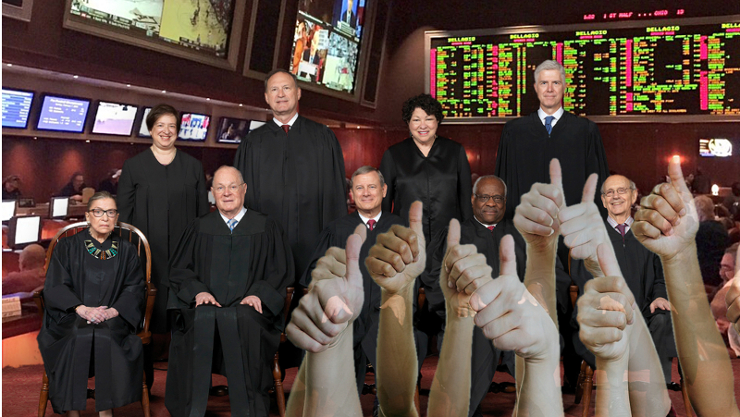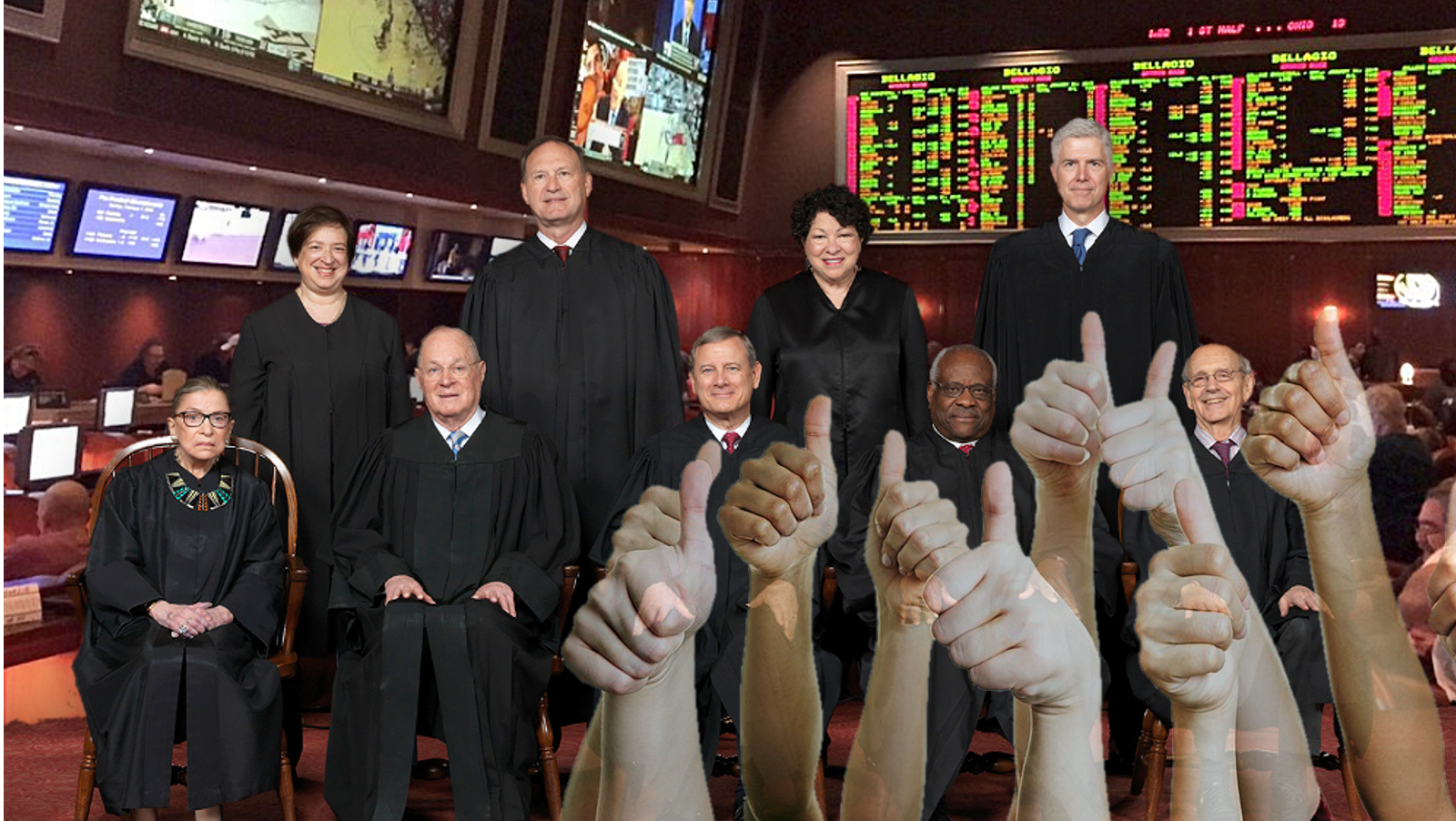
(This story will be updated throughout the day.)
The US Supreme Court has declared the federal ban on sports betting to be unconstitutional, opening up the floodgates on a new American legal betting landscape.
On Monday, the Court released its hotly anticipated decision in the case of New Jersey vs. the four major pro sports leagues, the NCAA and the US Department of Justice. By a vote of 7-2, the Court reversed the Third Circuit Court of Appeals ruling that struck down New Jersey’s plan to permit legal wagering at Atlantic City casinos and state racetracks.
The Court’s decision (viewable in full here) declares that 1992 Professional and Amateur Sports Protection Act (PASPA) violates the US Constitution’s 10th amendment, which prevents the federal government from ‘commandeering’ the authority of state governments. The Court said PASPA “unequivocally dictates what a state legislature may or may not do.”
The majority opinion declares that “the legalization of sports gambling requires an important policy choice, but the choice is not ours to make. Congress can regulate sports gambling directly, but if it elects not to do so, each State is free to act on its own.”
NEW JERSEY REACTS
New Jersey Gov. Phil Murphy, who inherited the sports betting quest from former Gov. Chris Christie, issued a statement saying he was “thrilled” by the Court’s ruling. Murphy noted his state had “long been the lead advocate in fighting this inherently unequal law” and credited Christie and former State Sen. Ray Lesniak for their “incredible bipartisan effort” in kicking PASPA to the curb.
Gov. Murphy added that he looked forward to “working with the legislature to enact a law authorizing and regulating sports betting in the very near future.” The state’s existing betting legislation selectively repealed state-level laws on betting at racetracks and casinos in order to comply with PASPA’s prohibition on states explicitly authorizing betting within their borders.
New Jersey has already begun the process of licensing sportsbook operators, and many casino and racetrack operators have already begun or completed construction of on-site sportsbooks.
William Hill US, which has partnered with New Jersey’s Monmouth Park racetrack on an onsite sportsbook, issued a statement through its CEO Joe Asher, expressing “great satisfaction” at the Court’s ruling and vowing to “get ready to open for business at Monmouth Park as soon as responsibly possible.”
Dennis Drazin, CEO of the company that manages Monmouth Park, held a press conference on Monday saying the track hoped to be offering sports betting before the end of the month, provided there’s no objection from Gov. Murphy.
New Jersey’s Division of Gaming Enforcement has yet to indicate whether it intends to allow sports betting to be conducted not only at casinos and tracks but also online, just as the state currently permits online casino and poker gambling. Nevada’s legal betting market has primarily been driven by mobile wagering activity in recent years, and while the original intent of New Jersey’s legislation was to drive foot traffic to its land-based gaming venues, it’s hard to see the state not taking advantage of the digital trend.
UPDATE: New Jersey’s State Senate introduced new sports betting legislation following Monday’s court ruling that would explicitly allow online sports betting. Online wagering revenue would be taxed at 12.5% versus 8% for land-based wagering.
Senate President Stephen Sweeney, who co-sponsored the bill, issued a statement saying legislators “want to act quickly to capitalize on the Court’s decision so that we can get sports gaming in place and operating in New Jersey.”
The bill would prohibit wagering on athletic events taking place in New Jersey and on competitions involving any New Jersey college, regardless of the event’s location.
WHAT NEXT?
Pressure will now mount on federal legislators to come up with new legislation to impose a uniform legal sports betting environment across the country, a scenario that gambling operators and the sports leagues would infinitely prefer to the dreaded ‘patchwork’ of individual state-level laws. (Although polls indicate the American public wants states, not the feds, to oversee betting.)
The Hill reported that Republican Senator Orrin Hatch plans to introduce a federal bill “in the coming weeks to help protect honesty and principles in the athletic arena.” Hatch’s office said the legislation would aim to “establish fundamental standards” for betting, including consumer protection and preserving game integrity.
The bill will also seek to shield states that choose not to enact betting from online wagering. Hatch, who hails from Utah, one of only two US states that permits no gambling, bemoaned the rise of online gambling and said Congress “cannot allow this practice to proliferate amid uneven enforcement and a patchwork race to the regulatory bottom.”
To date, West Virginia, Pennsylvania and Mississippi are the only other states to have passed sports betting legislation, but Monday’s ruling is expected to renew efforts in other states to get on the betting gravy train ASAP before their current legislative sessions conclude. The three states besides Nevada that were allowed some form of legal betting under PASPA — Delaware, Montana and Oregon — may decide they’re already good to go without additional legislation.
The share prices of UK-listed online gambling operators enjoyed a dramatic surge following the ruling, with William Hill closing out trading up 10.7%, Paddy Power Betfair gaining 12.4%, GVC Holdings up 7.4% and 888 Holdings rising 15.4%. US casino operators such as MGM Resorts and Caesars Entertainment also enjoyed gains, albeit more modest ones.
Monday’s ruling will in no way eliminate American bettors’ patronage of internationally licensed online sports betting operators, as the combination of sports league fees and government taxes — including Pennsylvania’s ridiculous 36% tax on betting revenue — will force state-licensed sportsbooks to pass on these costs to the consumer.
SPORTS LEAGUES REACT
The sports leagues will also intensify their efforts to lobby state governments regarding the leagues’ pursuit of an ‘integrity fee’ that they claim will help offset the expected costs of ensuring vigilance against efforts to manipulate sports outcomes. West Virginia legislators made no allowance for this cash-grab in their legislation but discussions are underway on a scenario in which the leagues would deal directly with gaming operators to ensure a fee for sports data rights for betting purposes.
Major League Baseball, which, along with the National Basketball Association, has been among the most ardent advocates of integrity fees, issued a statement saying Monday’s ruling would have “profound effects” on its games. MLB added that protecting game integrity remained its “most important priority” and the league will “continue to support legislation that creates air-tight coordination and partnerships between the state, the casino operators and governing bodies in sports toward that goal.”
The National Football League, which was the most vociferous opponent of legal betting, issued a statement saying its commitment to game integrity “remains absolute” and would lobby Congress to “enact a core regulatory framework for legalized sports betting.”
The NCAA, which has threatened to pull championship games from states that legalized betting, issued its own statement saying that while its legal eagles were still reviewing the ruling, it would “adjust sports wagering and championship policies to align with the direction from the court.”
Interestingly, the Court’s ruling was issued just hours after the NCAA announced a ten-year deal with Genius Sports to manage college sports data for licensing purposes. Given the pro leagues’ pursuit of exclusive betting data rights, it’s hard not to see the notoriously cash-hungry NCAA following suit.
OTHER REACTIONS
The National Thoroughbred Racing Association also wants in on the fun, issuing a statement saying now that betting has the Court’s stamp of approval, “our multi-billion dollar industry must rise to the challenges and seize the opportunities presented by this expansion of sports betting.”
Daily fantasy sports operators DraftKings and FanDuel, each of which has already signalled their intention to particpate in a legal sports betting market, issued separate statements on Monday indicating their desire to launch single-game sports betting services and to finally drop the shameless facade that they’re not gambling operators.
Tribal gaming operators in some states have stated that they view sports betting as another plank of their gaming compacts with state governments. Mark Macarro, chairman of California’s Pechanga tribe, issued a statement on Monday calling betting “a potential amenity that would complement our numerous offerings.” Macarro said the tribe looked forward to “engaging in a conversation with fellow tribal leaders, policymakers, and industry stakeholders to see if there is a path forward for sports betting in California.”
Similarly, National Indian Gaming Association chairman Ernie Stevens Jr. called tribal gaming operators “significant” stakeholders who were looking forward to “being at the table in establishing the critical regulatory framework” that will allow tribes to offer sports betting “in the same manner as non-tribal operators and in line with the principles established by the tribes.”
